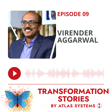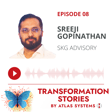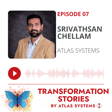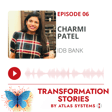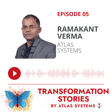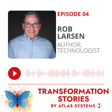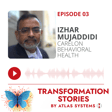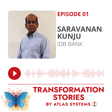Become a Creator today!Start creating today - Share your story with the world!
Start for free
00:00:00
00:00:01

#2: Amy Martinez
Amy Martinez, Associate Vice President at Blue Cross North Carolina, shares what she sees as the challenges and opportunities in the ever-evolving healthcare industry - from the dynamic relationship between payers and providers to exploring the untapped potential of real-time technology in healthcare. Through her journey and expertise, Amy provides a unique perspective on the need for continuous adaptation and growth.
Recommended
Transcript
Introduction to Transformation Stories
00:00:00
Speaker
This is Transformation Stories, a podcast from Atlas Systems, exploring how companies are leaping into the future through deliberate change and innovation.
Why Businesses Must Transform
00:00:11
Speaker
In today's digital landscape, businesses face a choice to transform or risk falling behind.
00:00:18
Speaker
Here the insights of visionaries and changemakers were driving transformation across various industries and roles. They'll share their experiences, strategies, and the most potent opportunities for success. Join us as we uncover the secrets of transformation.
Introducing Amy Martinez, Healthcare Expert
00:00:37
Speaker
Amy Martinez is AVP at Blue Cross and Blue Shield of North Carolina, also known as Blue Cross NC. She has 25 years of experience in the healthcare industry with various payers for commercial and government business with a focus on network development and management, quality, provider data, and program integrity. Originally from Colorado, Amy currently resides in Virginia Beach, Virginia.
00:01:04
Speaker
All right. Well, Amy Martinez, it's great to welcome you to Transformation Stories. Thank you so much for talking to Atlas Systems today. Thank you for having me. Very excited. So I think you know the theme of our podcast is transformation.
Amy's Role at Blue Cross NC
00:01:22
Speaker
But I'd like to start out by asking you to tell us a little about your current role at Blue Cross Blue Shield.
00:01:30
Speaker
Sure. So I'm currently the Associate Vice President at Blue Cross, North Carolina, and I currently have responsibility for network operations, which really encompasses the provider onboarding process, the provider data across the organization, and which includes credentialing, quality audit oversight, process improvement. That's
00:01:59
Speaker
That's the gist of it. And there is a slight dependency on contracting. So I work very closely with them because it is a component of it that I don't have direct oversight for.
Ongoing Evolution in Healthcare
00:02:13
Speaker
And so in that role, I mean, what does transformation mean to you in terms of how you work, what you're trying to accomplish? What does that word really mean for you in your job? Well, in terms of
00:02:29
Speaker
I think current role and honestly any past roles is it's really adapting, adapting to the environment and the landscape. I think about transformation as it's really an evolution. Like there isn't really a clear stopping point because you need to continue to evolve. You're continuing to transform. It's not, there isn't a line in the ground that this is the finish line. Like it is consistent and ongoing and should
00:02:58
Speaker
should always be that way. And I think it's critical, especially in the healthcare space and the healthcare industry, because it's something I don't think we've done well. I think we, as a healthcare industry, I think we have been a little bit behind in terms of technology, but I also think there's a lot of different
00:03:25
Speaker
bodies that we are all at the mercy of, adhering to different requirements and regulating bodies and accreditations. And I think that landscape has not evolved either, where, you know, when some of the requirements and regulations were implemented, you know, they made sense at the time. And I've been in the industry for almost for like 25 years, actually.
00:03:53
Speaker
you know, a lot of them did make sense at the time, but I don't think any of them have really evolved or changed much other than there may be additional things that have been added, but we haven't revisited what was already in place. And does it still make sense? Because I think that also dictates from a healthcare perspective, how we navigate and what our limitations are on the ability to transform. So I think it,
00:04:21
Speaker
us in to not be able to do and progress the way that I think we should be. So can you give me an example of a type of transformation that you think is really sort of waiting to happen, but is not yet quite there?
Challenges with Healthcare Accreditations
00:04:36
Speaker
Well, and when I think about without calling out the specific accrediting body, I think I have recently raised some awareness around one of the accreditations for I mean, all healthcare organizations, like it's
00:04:51
Speaker
It's really the golden star and the accreditation that everybody wants, right? But when I look at the requirements 20 some years ago, or I don't even think they were here that long ago, but 20 years ago-ish, they, if you looked at the requirements, they absolutely made sense. We should be looking at refreshing certain criteria at a set frequency and have to do that every few years.
00:05:17
Speaker
Fast forward to today's world and what we've experienced through those 20 years, there is a need to have ongoing maintenance, ongoing evaluation that shouldn't wait for a set year or set timeframe to look at criteria again. And because all those other factors are now in play, it almost eliminates the need to have that set criteria reviewed every set amount of years because we're already looking at it ongoing. And so it's costly.
00:05:47
Speaker
I don't think it's effective, and I think we're meeting it through multiple other avenues based on what's occurred over the course of time, meaning there's been different issues that have come up, whether it be a provider that's practicing that shouldn't have been a provider that was disbarred, not licensed. A lot of those events have triggered the need for
00:06:12
Speaker
Hey, we have a gap. This is something we should always be looking for. Cause that could happen any time of the year. Um, not just at a specified time. And because we've now all, for the most part, everybody's implemented something that's looking at that on an ongoing basis. I don't find the value in still having this set timeframe that we're required to look at it. If other than it's costly and we're adhering to a standard that is just still in place. And I don't know that it's been revisited.
AI and Payer Collaboration for Data Management
00:06:43
Speaker
You talked about the ability to transform through technology. Can you sort of name some of the capabilities or platforms, devices that you feel really have the potential or are already transforming what you do? Well, when I think about technology from a healthcare perspective, I mean, I'll
00:07:12
Speaker
reiterate, I do think healthcare has been a little bit behind and we're getting there. We're starting to kind of catch up to where things are at. But if you think about like the Googles and the Amazon, like we're definitely not there, not there yet to the same, um, extent that those organizations are, but from a healthcare technology perspective, you know, I think I'm aware of some AI technology.
00:07:40
Speaker
that I've just recently been introduced to that I'm gonna be learning more about, but a couple of other payers have really partnered closely to develop it. And it's now seeming like it's showing some promise and it's supposed to support really provider data, how and what that looks like. I don't really know it honestly to what extent, but I think that would really be something that would
00:08:07
Speaker
completely change the environment and completely change our landscape of provider data, how we look at it, how we ingest it, how we update it. And I also think there is opportunity across payers for us to align more closely to share and consolidate some of that information. And we are having those discussions honestly with several other payers where, you know, does it make sense?
00:08:37
Speaker
Is it proprietary? It's not proprietary. You know, that data is, for the most part, it's public knowledge. It's really how we're consuming it and how we approach it. I think there's power in numbers from a provider perspective. You know, they are able to send their information however they send it today and they can kind of control that narrative. And, you know, 18 different organizations have to adhere to that.
00:09:08
Speaker
In most cases, if it's a necessary provider, if it's a necessary group, that's usually what's occurred. A lot of our systems technology, it's not easy to accommodate that. In an ideal world, we'd be able to have one consistent format that every payer is using that then changes
00:09:30
Speaker
the approach from the provider perspective and helps to control how we're receiving information. We all might ingest and do something different with that data. That's up to each organization. But if we can at least start controlling some of the parameters, it just seems, it seems crazy to me that 20 years ago we were having the same conversation. We're still having it today, but now I'm starting to see traction being made. And I don't know if it's,
00:09:56
Speaker
nature of everybody recognizing it or we have the right people in the right roles that across the organizations now we're kind of linking hands and trying to figure out you know either that or it's just cause enough pain at this point where we have to link hands it just makes sense too. Yeah you were talking about people in roles I mean what about the the whole factor of getting cooperation and getting people to be on board with transformation you know what does it take to really
00:10:25
Speaker
drive transformation at the personal level, at the talent and resource level.
Impact of Culture on Transformation
00:10:32
Speaker
I think that's its own evolution because it's culture and the culture absolutely impacts the people and the people impact the culture. And most of us, myself included, a lot of times like you're entering an existing culture and you almost have to, I find myself, I'm trying to acclimate to current culture
00:10:54
Speaker
and change it at the same time. I'm just using recent experience, but I think I can relate this to any other organization or experience or role change within a large company. You're still entering an area where you're the unknown, and you're also coming in to implement change, change for the better.
00:11:22
Speaker
a part of that culture change is bringing people along and having inclusivity and you know, change is always easier. Transformation is easier when it's happening with you, not to you, you know? And I think that's part of transformation. It's not a change. And I think one of the things you had asked or mentioned was like, what is the difference between change and transformation? And I, when I think about change, that's a clear A and B, you know,
00:11:52
Speaker
B to D, like there's a clear start and a stop. And that is also, that's like a direction, that's instruction. Like here's what it is. There's not a lot of flexibility in that. There's not a lot of critical thinking and being innovative and thinking through what that might look like. So I think in a transformation, I think the people in the culture are a huge component and bringing people along with you for that.
00:12:23
Speaker
because it can't be one person if it's true transformation, right? Like you need a lot of people thinking through this to really get what you want and to really cover the gamut of like, what are the potential ideas that are out there and creating a culture and an environment where it's okay to fail? I don't think any of us have really progressed in our roles or life like from being right all the time and not being wrong.
00:12:53
Speaker
For the most part, I always say, for the most part, we've all learned the most things from doing it wrong and failing. It's recovering and bouncing and bouncing back and not letting failure be the detractor.
Consumer Tech's Influence on Healthcare Expectations
00:13:07
Speaker
I was wondering, do you feel that consumers and their growing use of technology and expectations of technology and of platforms like provider directories, is that really transforming your
00:13:22
Speaker
your world as well? Is it really transforming how you and other payers approach all of this information and the importance of it, the format of it? How does that play in? I think it would be insane if it didn't. We would be ignoring, we would be ignoring a lot if we weren't approaching it from that perspective. I mean, ultimately that's, we're all here for
00:13:50
Speaker
to serve the member, to serve the consumer, to make sure that they have the highest quality and the ease of interaction, including the providers. Like if we don't have the providers here or the network here, then that poses issues and risks. I think we'd be foolish if we weren't thinking about it from that perspective, because we know from a consumer perspective and all of us as individuals included, we know how easy it is to, you know,
00:14:18
Speaker
shop on Amazon, it's at my door tomorrow. And from a provider perspective, information being updated, I mean, we are absolutely looking at it from that perspective and would love to have something that has that ability where the minute they update it, we have it, it's in the system. Like there's automation, there's not a lot of manual entry, it improves accuracy, it improves timeline, directories,
00:14:46
Speaker
It improves everything, but you have to be looking at it from a real time basis. I mean, how close can we get to that? Like to be determined, but I think that's honestly how we have to be looking at it. Cause that's, I think that's what the standard and what the expectation is from every other avenue that they are leveraging technology, like on a personal level. I mean, yeah, they're looking at it from a professional level too. And I think that's where healthcare is, has not been there yet.
00:15:15
Speaker
What about providers, payers and their relationships with providers and how those are kind of mitigated by technologies to some degree that are either flawed or improving. What do you think is the potential there for things to improve or to be transformed?
00:15:39
Speaker
Well, I think the relationship, so some of that plays into the technology. I think the other component, I think of it as tying into the relationship.
00:15:51
Speaker
Then you do get into a little bit of like proprietary information, meaning does it impact reimbursement? Is there like different incentives, different programs like that we'd offer and leverage, whether it be from quality basic, like a needs, like filling a gap for us, whether that's from a network perspective, from a medical perspective.
00:16:18
Speaker
I think that's where we can and should get creative. And I think that's what's absolutely happening across the industry with other payers. And it's something I think everybody's looking at. How we all approach that may be different based on your business, your environment, and your landscape, and whatever your footprint might be. Can you, without giving away too much, is it possible you could sort of describe
00:16:45
Speaker
a very specific example of transformation that you were involved in, that you felt was important and successful and really sort of speaks well about the potential for transformation. A specific example that comes to mind is looking at an area where we had a significant gap in
00:17:15
Speaker
process and in knowledge.
Eliminating Single Points of Failure
00:17:19
Speaker
And honestly, it was it was a risk to the organization. And so approaching that and looking at that, we had we had potentially like a single point of failure where we had to come in and think about the work differently based on not only the landscape, the growth and the dynamics of the organization.
00:17:46
Speaker
It was changing the mindset one of where that single point of failure was, that's culture and people and how we evolved that to be something that was not really transactional. It turned into something that was built to support the organization and had the systems tools, policies and technology to really support
00:18:14
Speaker
that continued growth and transformation of eliminating a single point of failure, ensuring that we had all of the right sources of truth, which were extensive and across multiple states, multiple accrediting bodies, regulating bodies,
00:18:39
Speaker
from a state and a federal perspective to bring all of that information in and create something that has longevity to kind of maintain and continue to transform over time as any of those dynamics change. I just think again about the potential for transformation. Are there any other opportunities
00:19:07
Speaker
for transformation that you see, you know, really right in front of you in terms of technology, in terms of, you know, other things that you think would have real broad application.
Real-Time Feedback in Healthcare Systems
00:19:20
Speaker
Um, you know, one thing I've always, I've keep thinking about, and I, I really haven't seen us get there from a healthcare perspective yet is, and I always relate it to, you know, my experience as a consumer and
00:19:35
Speaker
I may use Google, I use Amazon. And when I think about every time I've stopped at a restaurant or a store and two seconds later or the next time I look at my phone, my phone's asking me, is this still located here? Is the front door still there? Or can you add anything about your experience or something? So it already knows that I was there and it's within minutes. And when we think about
00:20:05
Speaker
healthcare, there's certain things that are required, right? We have to do surveys. We have to do some type of outreach. Like a lot of it's required from a member and provider perspective. How, why can we not get to that real time? Like the minute you leave the doctor's office, like it should know. I heard, I heard the prescription of XYZ it's already filled. It's already at the pharmacy and Hey, how'd you, what'd you think of the provider? Was the office clean? You know, some of the basic things that Google's figured that out.
00:20:35
Speaker
From a healthcare perspective, we have a lot of requirements surrounding that. And I know it's more challenging because, because of some of our antiquated bodies where we're hearing to certain criteria that has to be included or verbiage that has to be there, or sometimes it has to be a physical letter. And most people don't even check the mail anymore. So I think there's a lot of opportunity to leverage what Google has already figured out to be really great at. But from a healthcare perspective, you know, it's real time.
00:21:06
Speaker
And if I'm right here right now, if it's a bad experience, they're probably going to immediately fill it out. Right. Like most people would, but if it's a great experience, we might get 30%, maybe 50% most people just dismiss it because it was fine. Nothing to complain about, but you know, if it was real time, I think we'd have higher response rates. You'd have information that could potentially be feeding into, you know, everybody's looking to get whole person health right now. It's.
00:21:36
Speaker
We have a, I think it's all segmented, right? Like even us as consumers, like I might, there might be mental health here. I'm having this conversation with this provider and then I have my PCP and then I might have some critical issues related to something else. And I'm dealing with an orthopedic. There's nothing really that's bringing that all together. And I think we're all trying to get there and that's been the case for, for a while, but then having somebody really look at the whole person.
00:22:06
Speaker
What are all of the different factors? How do we filter that back to make sure every discussion I'm having with different providers, the recommendations, discussions, whatever it might be, guiding the patient care is looking at the whole person versus I'm looking at my portion because this is what I have, right? And not depending on you to fill out
00:22:31
Speaker
18 pages of documents when you arrive that has to remember everything that you've had over the last like seven, eight months, who, what other providers are talking to and what other issues?
Need for Holistic Patient Health Views
00:22:41
Speaker
Cause honestly, typically at that point in time, like all you're caring about is like, I have a pain in my shoulder. This is all I'm worried about right now. I just want this resolved. Like, but how they treat you might be different if they were looking at like the full view and the full picture. And I don't think
00:22:59
Speaker
we've really mastered that yet, but I'm going to come back to that same type of technology. Like if there was something live that's listening, because our phones are listening, right? Like this is how it knows some of the information that it knows, like it identifies some of it could be feeding somewhere with grabbing all that information. I mean, I think we're getting closer to that from a technology perspective, not necessarily that technology, but
00:23:28
Speaker
having a single source that's pulling that information and wherever it lives with any organization, like pulling that all in to have that view, but it's taken some time to get there. And I still just don't think we've, we're not a hundred percent for sure, but that's really where we should and need to be going. And I think everybody is trying to figure out, you know, how do we get there and what are the necessary technology
00:23:57
Speaker
What's the necessary technology to get us there to really close that gap? Because I think with any organization, a lot of that's not living in the same place. That's great. Just one more question.
00:24:09
Speaker
just thinking about your own career and, you know, different ways that you have transformed and maybe that you still want to transform. Is there any sort of guidance or thoughts you have on the importance of transformation at a personal level or, you know, how to make it happen and how to focus on it?
Personal Growth and Professional Impact
00:24:32
Speaker
You know, I thought about that and I think
00:24:35
Speaker
For me personally, I think transformation equals growth, growth equals transformation, and it's hard to put your finger on it to say it's a specific time, it's a specific skill, or it takes a certain amount of experience, because I think that can look and be different for everybody. Some might be shorter, some might be longer, but I think for me,
00:25:01
Speaker
I think personal growth has absolutely impacted my professional growth. And I think that is through different life experiences that have kind of forced you down different paths of learning that really change your perspective and how you look at things. You know, some of that has been through the course of my career, but I think on a personal level, some of it,
00:25:31
Speaker
wasn't where I needed to take a step back and look at things differently. And I think with that, you kind of can't help but change. You can't help to evolve. It just happens. And for me, I think a pivotal point was probably like five years ago when I think I hit a different point and I couldn't even pinpoint exactly what it was. I think it was a series of multiple events that
00:26:01
Speaker
that triggered it, that led up to that point where it was just like all the lights went on. And, you know, I felt like I had been very, I had been content with my career, but I also think I had, and I had been looking at it, I think from like maybe the 5,000 foot level. But when I took another step back, I realized, hey, like there's this whole other period, like I was not even thinking about,
00:26:32
Speaker
And then I think when you translate that like to professional experience and professional environment, you really just can't help but transform. Like there's no way I could think about, if somebody was asking me to solve this one issue, I can't think about the 5,000 other impacts that it has and thinking about the landscape, the environment, and how all of this interacts together versus if it's very transactional and you're
00:27:00
Speaker
you're so in the weeds with it. Because there's necessary, there's a need for that too, right? If that's just your expertise and this is what you're amazing at, that's critical and very important too. But if you're there sometimes, you don't really see the other things that are happening or the impacts that it has. And that's where I think it gets a little bit dangerous unless you're partnering with somebody that does have that view. Otherwise it seems very transactional and not
00:27:31
Speaker
not transformation, but I think it's a combination of personal and professional, like experience, life experiences will impact it. But I wouldn't say it's one specific skill set that I could define of like, you absolutely need this other than I think you need to be, you need to be open, transparent, and can receive it.
00:27:56
Speaker
Thanks so much, Amy. Really appreciate your time today and really good conversation. Lots of insights. So thank you for taking the time to speak with us. Yeah, absolutely. Thank you. I appreciate it. Well, that was great. Thank you so much.
Embracing Change and Closing Remarks
00:28:34
Speaker
And that's a wrap on today's episode of Transformation Stories. If you found this episode as enlightening as we did, be sure to subscribe, rate, and leave a review. Your feedback fuels our mission to bring you more thought provoking conversations.
00:28:50
Speaker
As we conclude today's journey, remember that transformation is within reach for every business, and it starts with deliberate choices. Keep pushing boundaries, seeking new opportunities, and embracing change. Until next time, this is Transformation Stories.
